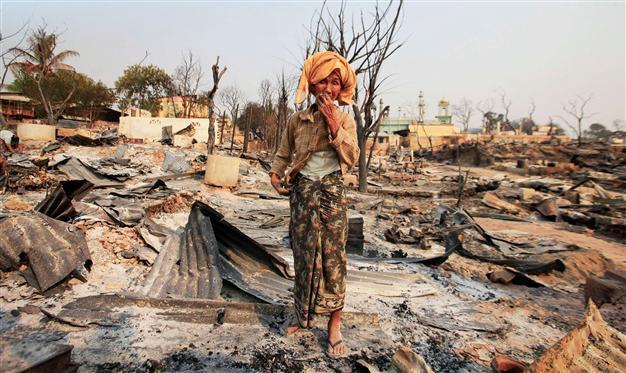
A Buddhist woman cries for her home that was burned down during a riot in Meikhtila in this March photo. A new report by HRW accused Myanmar authorities of aiding the ethnic cleansing of Rohingya Muslims. REUTERS photo
Authorities in Myanmar’s Rakhine State aided the ethnic cleansing of Rohingya Muslims last year in crimes against humanity that have sparked anti-Muslim violence elsewhere in the country, Human Rights Watch (HRW) said today. LUXEMBOURG -
Agence France-Presse
The European Union plans to lift the last of its trade, economic and individual sanctions against Myanmar on Monday as it embarks on "a new chapter" with the once pariah state.
"The EU is willing to open a new chapter in its relations with Myanmar/Burma, building a lasting partnership," said the draft of an EU foreign ministers' statement obtained by AFP.
A year after first suspending sanctions against Myanmar in reward for its historic reforms, EU foreign ministers meeting in Luxembourg will announce a definitive end to restrictive measures but leave in place an arms embargo.
"In response to the changes that have taken place and in the expectation that they will continue, the Council (of ministers) has decide to lift all sanctions with the exception of the embargo on arms," the statement added.
It warns however that "there are still significant challenges to be addressed", in particular an end to hostilities in Kachin state and appeasement of the tensions regarding the Rohingya people.
New York-based Human Rights Watch said Monday that Myanmar has waged "a campaign of ethnic cleansing" against Rohingya Muslims, citing evidence of mass graves and forced displacement affecting tens of thousands.
To help Myanmar on the economic front, the foreign ministers will offer to look at the feasibility of a bilateral investment agreement, as well as more development assistance.
To help it deal with inter-communal violence, the EU is studying the possibility of assisting the reform of the police service, in partnership with its parliament, the statement adds.
On April 23 last year, the ministers agreed to a one-year suspension of measures targeting almost 500 individuals and more than 800 firms to bolster a reform process which the same month saw opposition leader Aung San Suu Kyi's election to parliament.
Among the sanctions, hundreds of people were targeted by a travel ban and asset freeze, while on the economic front the EU had barred investments and banned imports of the country's lucrative timber, metals and gems.
During a visit to Brussels last month, the first by a Myanmar head of state, President Thein Sein urged the EU to lift sanctions, saying "we are one of the poorest countries in the world." He received pledges of EU economic assistance coupled with calls to protect his country's ethnic minorities.
Since the former premier took over the presidency in March 2011, thousands of political prisoners have been released and elections held.
EU development aid since has more than doubled to around 150 million euros for 2012-2013, with Brussels pledging to explore the feasibility of a bilateral investment agreement.
The EU is also offering "a swift reinstatement" of preferential tariffs with Yangon.